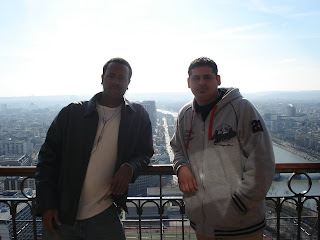I was having trouble trying to find another French movie I would be interested in watching. While sitting in class one day, Professor Tung recommended I watch Three Colors: Bleu. Tung told me about the movie and it seemed something I would be interested. So, I decided to watch it during class one day.
Three Colors: Bleu is the first movie in the Three Colors trilogy. The other two movies are called White and Red, respectively. The story follows a woman named Julie de Courcy, who is the wife of a famous composer. After a series of tragic events, Julie is trying to cope with her life now. Julie, along with her husband and her daughter, were involved in a fatal car accident, which took the lives of her family. However, Julie survived the crash. With her life in shambles, Julie tries to commit suicide while recovering in the hospital. She has just lost the two most important things in her life, and she feels an empty void that she thinks she can get rid of by ending her life.
After recovering physically, Julie has yet to recover from the accident both mentally and emotionally. Instead of facing her problems, Julie decides to try a different tactic, and she tries to run away from her problems. As soon as she leaves the hospital, she decides to abandon her estate and start a new life in Paris, in an attempt to erase her previous life. One of the ways in which she tries to complete this is to seduce her husband's composer friend and writing partner, Oliver Benoit, on an old mattress in her old estate.
However, as Julie is trying to forget her previous life, her previous life does not want to let Julie go. While she was in the hospital, a reporter came to interview her and to ask her about a rumor concerning her husband. Apparently, the rumor was that he was not the one composing the music that made him famous, but that it was actually Julie writing the material. When she leaves the hospital, Julie takes the notes of her late husband's unfinished work, a piece that was supposed to celebrate the creation of the European Union, and destroyed it.
However, while Julie is trying to continue her life in Paris, France, another copy of her husband's great masterpiece resurfaces, bringing back her past. For some reason, this copy of the music ends up being the catalyst that opens up many doors that were once locked in her past. She is finally forced to confront many issues that she thought she had buried, along with her husband and daughter. Julie discovers that her husband had been unfaithful, and that the other woman is carrying his child. She also falls in love with Oliver, her husband's good friend and the man she unsuccessfully tried to seduce as soon as she left the hospital.
All these new issues and controversies in her life beg the question as the film ends, will Julie finish her husband's work of art, or will she let it die along with him?
At first, I felt that I was not going to like this movie. I felt it started up slow, and I thought that I was going to just tune it out and not like it. As it turns out, I ended up enjoying the movie quite a bit. This first movie of the trilogy (which are named in reference to the three colors on the French flag, something I didn't realize until I saw a picture of the three movie posters next to each other!) is about liberty. I thought it was an excellent movie, and I recommend it to any movie lover.




